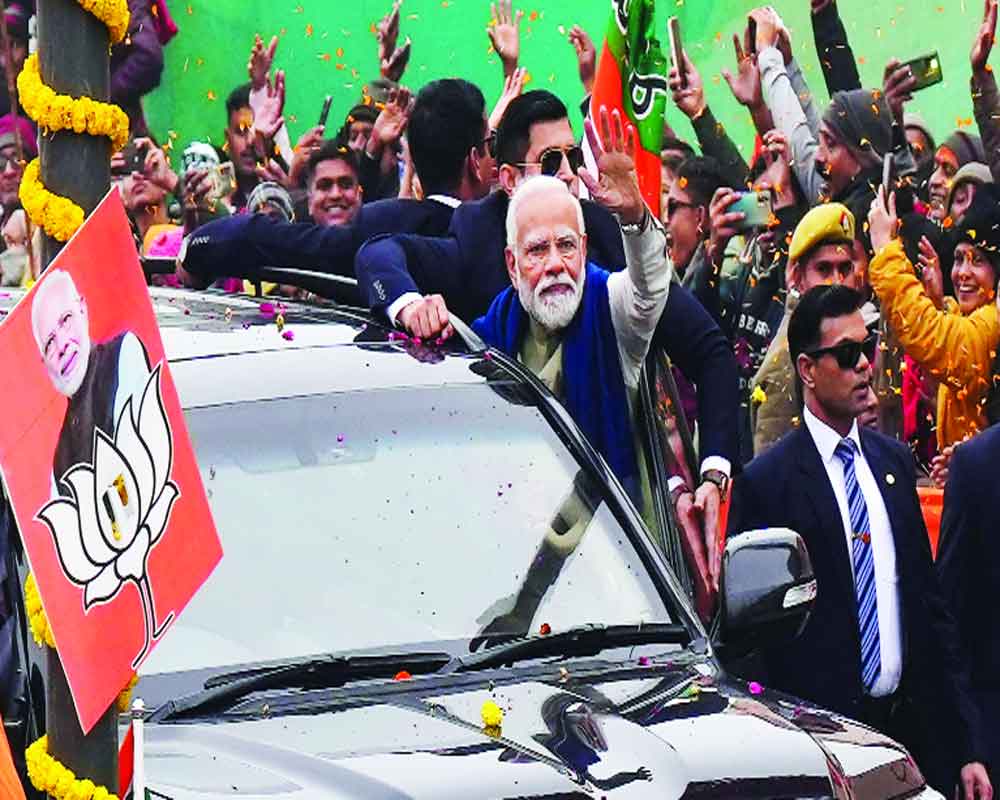PM unveils new look Ayodhya ahead of Ram Lalla consecration
Prime Minister Narendra Modi, on Saturday, urged “Ram Bhakts” to light a diya in every home, much like the Diwali festivities across the country on January 22, when the consecration of Ram Lalla will take place at the newly built Sri Ram Janmabhoomi Temple in Ayodhya. Emphasising the strength of vikas (development) and virasat (heritage) that will propel the country forward, the PM appealed to people to light special diyas — Shri Ram Jyoti — in their homes to celebrate the day as Deepawali. Modi mentioned that the entire world is eagerly anticipating the historic Ram temple consecration ceremony.
However, he appealed to people not to come to the city for the event, as the occasion will be marked by a mega event, and the holy city may not be able to accommodate their needs.
“Everyone harbours the dream of witnessing Ram Lalla. However, I earnestly request, with folded hands, that you refrain from coming on the Pran Pratistha day. Devotees are encouraged to plan their visit to Ayodhya from the following day, as the Ram Temple is now a permanent and magnificent structure. God will transition from his 550 years of tent accommodation to a lasting, grand building,” Modi conveyed to a massive crowd in Ayodhya, where he launched several projects, including new airport, railway station, trains, and improvements to road and civic infrastructure.
“There was a time when Lord Ram was ‘living under a tent,’ but now he will have a concrete house, much like the four crore poor individuals who have received pucca houses,” he stated.
Emphasising that the influx of people from across the country and the world to Ayodhya has begun and will continue indefinitely, the Prime Minister also appealed for a collective commitment to make the town the cleanest in the country.
Designating January 22 as a special day, the Prime Minister urged people to initiate cleanliness drives at pilgrimage sites and temples across the country from Makar Sankranti on January 14 until the day of the temple consecration.
The year-end visit by the Prime Minister precedes the “pran pratishtha” or consecration ceremony of the Ram temple by a few weeks. The temple is currently under construction, and the ceremony is scheduled for January 22, with the Prime Minister in attendance.
During the day, the Prime Minister inaugurated the Maharshi Valmiki airport and the redeveloped Ayodhya railway station. He also flagged off two Amrit Bharat and six Vande Bharat trains, some virtually.
Modi further inaugurated and dedicated to the nation, as well as laid the foundation stone for multiple development projects worth more than Rs 15,700 crore. These include projects worth approximately Rs 11,100 crore for the development of the city and its surrounding areas, as well as those valued at about Rs 4,600 crore for other initiatives in Uttar Pradesh.
Upon arriving in the temple town earlier in the day, Prime Minister Modi conducted a roadshow from the airport to the railway station, warmly greeted by a large number of people gathered along its route. Uttar Pradesh Governor Anandiben Patel and Chief Minister Yogi Adityanath received the Prime Minister at the airport.
Modi exchanged greetings with people from his car and, at one point, opened the vehicle’s door to wave back at them. People showered flower petals, waved BJP flags, and chanted slogans in his praise. The Prime Minister also enjoyed performances by cultural troupes along the route. Modi also visited Lata Mangeshkar Chowk, where a giant-sized Veena has been installed. A devotional song sung by Lata Mangeshkar played during his visit.
Despite the biting cold, vibrant performances ranging from the ‘Dedhiya’ dance of Uttar Pradesh to a colourful presentation of ‘Choliya’ from Uttarakhand adorned the streets of Ayodhya, showcasing the folk colors of India to welcome the Prime Minister.
The stretch of Ram Path, which was part of Modi’s carcade route, was adorned with flowers, particularly at the Lata Mangeshkar Chowk roundabout. Recently installed sun-themed ornamental columns, known as Surya Stambhs, on Dharm Path, added to the festive atmosphere.
Huge posters featuring images of Modi and Ayodhya’s Ram temple, whose consecration ceremony is scheduled for January 22, were displayed at regular intervals along the carcade route.
The Prime Minister also made a stop at the home of Ujjwala beneficiary Meera Majhi. He visited the family in their humble home and was seen enjoying a cup of tea.
The inauguration of the airport and railway station was scheduled after the roadshow. Accompanying him were Adityanath, Railway Minister Ashwini Vaishnaw, and others. Vaishnaw briefed Modi about the station, whose facade is inspired by traditional temple architecture.
Phase-I of the redeveloped station, named Ayodhya Dham Junction Railway Station, has been completed at a cost of over Rs 240 crore, according to officials. The three-storey railway station building is equipped with features such as lifts, escalators, food plazas, shops for puja needs, cloakrooms, and waiting halls.
The Prime Minister flagged off two new Amrit Bharat trains—the Darbhanga-Ayodhya-Anand Vihar Terminal Amrit Bharat Express and the Malda Town-Sir M Visvesvaraya Terminus (Bengaluru) Amrit Bharat Express.
He also inaugurated six new Vande Bharat Trains, including the Shri Mata Vaishno Devi Katra-New Delhi Vande Bharat Express, Amritsar-Delhi Vande Bharat Express, Coimbatore-Bangalore Cantt Vande Bharat Express, Mangalore-Madgaon Vande Bharat Express, Jalna-Mumbai Vande Bharat Express, and Ayodhya-Anand Vihar Terminal Vande Bharat.
During the airport inauguration, Union Minister for Civil Aviation Jyotiraditya Scindia, Union Minister of State for Civil Aviation Gen (Retired) VK Singh, Chief Minister Adityanath, and other leaders accompanied Modi.
The terminal building’s facade depicts the architecture of the upcoming Ram temple, while its interiors are adorned with paintings and murals illustrating the life of Lord Ram. Phase-1 of the airport has been developed at a cost exceeding Rs 1,450 crore, according to officials. The airport’s terminal building will cover an area of 6,500 sqm, serving approximately 10 lakh passengers annually.
The airport is expected to improve connectivity in the region, fostering increased tourism, business activities, and employment opportunities.


























